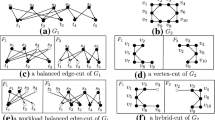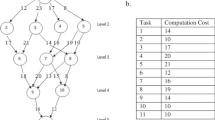Abstract
A heuristic approach to the problem of assigning a set of preemptible resource-sharing and blockable real-time tasks to be executed in a set of heterogeneous processors communicated through an interprocessor network, is presented. The problem is NP-hard. The empty-slots method is used to test the RM schedulability in each processor. There are placement, time, memory, communication and precedence constraints. A general expression for the modification of hard-precedence deadlines of related tasks executing in the same or in different processors is given. The effects of the Average Processor Utilization Factor and the Network Bandwidth on the number of solutions found are shown and discussed through systematic sets of examples. Also, Success Ratios are obtained and plotted vs. Average Processor Utilization Factors for different Network Bandwidths. Results obtained are compared to those obtained by other methods.
Similar content being viewed by others
References
Borriello, G. and Miles, D. 1994. Task scheduling for real-time multiprocessor simulations. 11th Workshop on Real-Time Operating Systems and Software, pp. 70–73.
Cheng, A. M. K., Browne, J., Mok, A., and Wang, R. 1993. Analysis of real-time rule-based systems with behavioral constraint assertions specified in Stella. IEEE Trans. Software Eng. 19(9): 863–885.
Chetto, H., Silly, M., and Bouchentouf, T. 1990. Dynamic scheduling of real-time tasks under precedence constraints. Real-Time Systems 2: 181–194.
Ferro, E., Orozco, J., and Santos, J. 1993. Scheduling of real-time tasks with blocking conditions (in spanish). Proc. XIX Conferencia Latinoamericana de Informática, pp. 14-19–14-27.
Joseph, M., and Pandya, P. 1986. Finding response times in a real-time system. The Computer Journal 29(5): 390–395.
Katcher, D., Arakawa, H., and Strosnider, J. 1993. Engineering and analysis of fixed priority schedulers. IEEE Trans. Software Eng. 19(9): 920–934.
Leung, J., and Whitehead, J. 1982. On the complexity of fixed priority scheduling of real-time tasks. Performance Evaluation 2(4): 237–250.
Lehozcky, J. P., Sha, L., and Ding, Y. 1989. The rate monotonic scheduling algorithm: Exact characterization and average case behavior. Proc. Real-Time Systems Symp. IEEE CS, Los Alamitos, CA, pp. 166–171.
Liu, C. L., and Layland, J.W. 1973. Scheduling algorithms for multiprogramming in a hard real-time-environment. J. ACM 20(1): 46–61.
Ma, P.-Yi R., Lee, E., and Tsuchiya, M. 1982. A task allocation model for distributed computing systems. IEEE Trans. Computers 31(1): 41–47.
Muntz, R., and Coffman, E. 1970. Preemptive scheduling of real-time tasks on a multiprocessor system. J. ACM 17(2): 324–338.
Obenza, R. 1993. Rate monotonic analysis for real-time systems. IEEE Computer 26(3): 73–74.
Ramamritham, K. 1990. Allocation and scheduling of complex periodic tasks. Proc. 10th International Conference on Distributed Computing Systems, pp. 108–115.
Ramamritham, K., Fohler, G., and Adan, J. 1993. Issues in the static allocation and scheduling of complex periodic tasks. Proc. IEEE RTOSS, pp. 11–16.
Santos, J., Gastaminza, M. L., Orozco, J., and Matrangolo, C. 1994. 802.5 priority mechanism in hard real-time RMS applications. Computer Communications 17(6): 439–442.
Santos, J., Gastaminza, M. L., Orozco, J., Picardi, D., and Alimenti, O. 1991. Priorities and protocols in hard real-time LANs: implementing a crisis-free system. Computer Communications 14(9): 507–514.
Santos, J., and Orozco, J. 1993. Rate monotonic scheduling in hard real-time systems. Information Processing Letters 48: 39–45.
Sha, L., Rajkumar, R., and Lehoczky, J. 1990. Priority inheritance protocols: An approach to real-time synchronization. IEEE Trans. Computers 39(9): 1175–1185.
Stankovic, J. 1988 (Ed.). Real-time computing systems: The next generation. IEEE Computer 21(10): 10–19.
Tindell, K., Burns, A., and Wellings, A. 1992. Allocating hard real-time tasks: An NP-hard problem made easy. Real-Time Systems 4: 145–165.
Xu, J. 1993. Multiprocessor scheduling of processes with release times, deadlines, precedence and exclusion relations. IEEE Trans. Software Eng. 19(2): 139–154.
Zhao, W., Ramamritham, K., and Stankovic, J. 1987. Preemptive scheduling under time and resource constraints. IEEE Trans. Computers C-36(8): 949–960.
Author information
Authors and Affiliations
Rights and permissions
About this article
Cite this article
Santos, J., Ferro, E., Orozco, J. et al. A Heuristic Approach to the Multitask-Multiprocessor Assignment Problem using the Empty-Slots Method and Rate Monotonic Scheduling. Real-Time Systems 13, 167–199 (1997). https://doi.org/10.1023/A:1007933607293
Issue Date:
DOI: https://doi.org/10.1023/A:1007933607293




